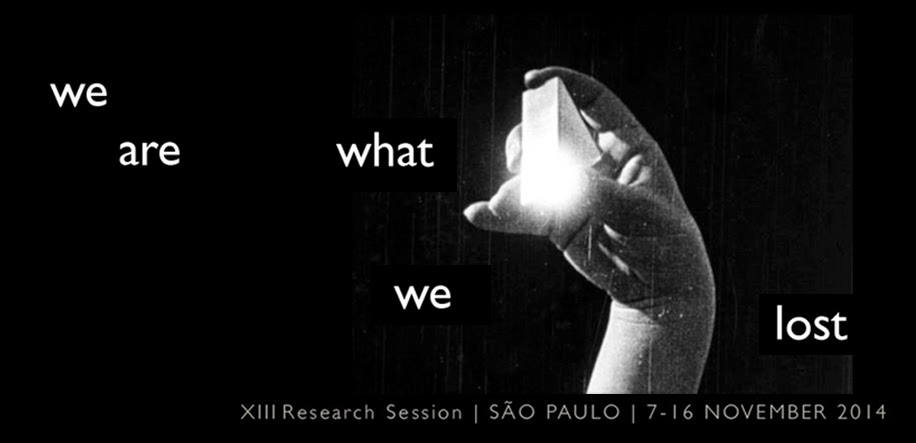Friday, October 31, 2014
Tuesday, October 14, 2014
We Are What We Lost | XIII OuUnPo Research Session
São Paulo | November 7-16, 2014
OuUnPo, Vision Forum and Curatorial Mutiny are proud to announce:We Are What We Lost
XIII OuUnPo Research Session | São Paulo | November 7-16, 2014
Curated by Sara Giannini.
We Are What We Lost is a mobile festival organised by the European artistic network OuUnPo | Ouvroir d’Univers Potentiels in cooperation with Brazilian artists, researchers and institutions. Each day a series of actions, talks, screenings, workshops and performances will be enacted in different venues and locations across São Paulo.
We Are What We Lost is the 13th session that the group arranges and will close the cycle “Catastrophe & Heritage” (2012-14) where OuUnPo has investigated crisis, conflict and how these affect the formation of identities. Previous sessions have been held in Beirut (2012), Tokyo (2013) and Gibellina (2014). In each country the group has explored different forms of collaborative expressions by working with local artists, curators, researchers and institutions.
Over the span of 10 days, We Are What We Lost will become a platform to experiment with disappearance as a metaphor and research question. The session will look at how loss influences our being in the present as well as in what way it affects our dialogue with the past. How do we take in voids and vestiges to generate sense and revisit memory? How do ruptures and new constellations shape our experience and understanding of time and temporality?
Curated by Sara Giannini.
We Are What We Lost is a mobile festival organised by the European artistic network OuUnPo | Ouvroir d’Univers Potentiels in cooperation with Brazilian artists, researchers and institutions. Each day a series of actions, talks, screenings, workshops and performances will be enacted in different venues and locations across São Paulo.
We Are What We Lost is the 13th session that the group arranges and will close the cycle “Catastrophe & Heritage” (2012-14) where OuUnPo has investigated crisis, conflict and how these affect the formation of identities. Previous sessions have been held in Beirut (2012), Tokyo (2013) and Gibellina (2014). In each country the group has explored different forms of collaborative expressions by working with local artists, curators, researchers and institutions.
Over the span of 10 days, We Are What We Lost will become a platform to experiment with disappearance as a metaphor and research question. The session will look at how loss influences our being in the present as well as in what way it affects our dialogue with the past. How do we take in voids and vestiges to generate sense and revisit memory? How do ruptures and new constellations shape our experience and understanding of time and temporality?
Tuesday, September 16, 2014
We are proud to announce that Pinacoteca and SP Escola de Teatro will host events during the Sao Paulo session and also that the Embassy of Sweden in Brazil supports our projects. More info soon.
Friday, April 25, 2014
Dates and New Partners for the Sao Paulo Session
OuUnPo is proud to announce the dates for the upcoming session in Sao Paulo along with partners Casa do Povo, Kunsthalle Sao Paulo and Videobrasil.
The session will open on November 7 with a presentation of the events and a welcoming to friends from close and afar. The session will then move across Sao Paulo until the closing event on November 16.
Further details, program and partners will be disclosed on this website continuously, so keep your eyes peeled.
Tuesday, February 18, 2014
Goethe institute confirms collaboration for Sao Paulo Session
We are proud to announce our third partner for the Brazilian session. Goethe Institut in Sao Paulo has confirmed their collaboration with OuUnPo.
Friday, December 20, 2013
MAM confirms collaboration for Sao Paulo Session
We are proud to announce that our second partner for the Brazilian session has been confirmed. Museu de Arte Moderna, or MAM has confirmed their collaboration with OuUnPo. We will hopefully shortly conirm more partners. Keep you eyes peeled on the website.
Monday, September 2, 2013
Update of the project for Sao Paulo: Curatorial framework
Within the research context of “Catastrophe and Heritage,” the OuUnPo session in Brazil will explore disappearance, a state where end is another word for transformation and where the absence is another form of being. In close collaboration with numerous Brazilian partners, a 7-day event will be created to experiment with the impalpable as a metaphor, research question and methodology.
The unique Brazilian context will allow us to look at how loss reverberates and affects the shaping of our being in the present as well as our dialogue with the past. OuUnPo members and local artists, curators, institutions and researchers will be engaged in both a theoretical and practice-based research with the aim of understanding how we perceive history in the present and how the past is constantly reactivated in the shaping of cultures. The group will approach local collections, archives in an interrogative manner, highlighting the invisible tension between absence and presence.
How do we integrate voids and vestiges to generate sense and formulate memory? How can ruptures and unending amalgamations help us to get a deeper understanding of time and temporality? To approach these questions the group will build on four central concepts. These will serve as platforms between the visiting group and the local creators and institutions and will allow for learning and creation that embraces differences and similarities among all the participants in the project.
Subscribe to:
Posts (Atom)




